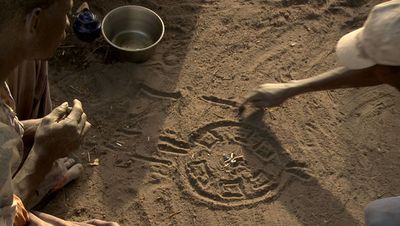It all depends #3
On May 23, 2014 the exhibition "Regulado" by Filipa César und Suleimane Biai by opens at the Neuer Berliner Kunstverein (n.b.k.) as part of the Visionary Archive project. In her films and installations, Filipa César explores the post-colonial constellations that were spawned by the recent history of Portugal. Since 2011, her research is focused on the film production in Guinea-Bissau, the beginnings of which were closely linked to the struggle for liberation.
In the "It All Depends" series at Arsenal, they will be presenting their film REDONDA QUADRADA and their project "From Boé to Berlin". Two films from our archive (POR PRIMERA VEZ by Octavio Cortázar, REASSEMBLAGE by Trinh T. Minh-ha) and a documentary by Sana na N'Hada from the early years of the independent Guinea-Bissau will lay out film historical threads for the discussion. (May 25, 2014)
REDONDA QUADRADA Filipa César, Suleimane Biai, Germany 2014, OV/EnS, 8 min
POR PRIMERA VEZ Octavio Cortázar, Kuba 1967, OV/GeS, 9 min
LES JOURS D’ANCONO Sana na N’Hada, Guinea-Bissau 1978, OV/EnS, 27 min
REASSEMBLAGE Trinh T. Minh-ha, USA 1982, OV, 40 min
REDONDA QUADRADA evaluates the differences of two house construction methods. Pragmatic and aesthetic considerations become an important factor, but also historical connotations and the politics of different rooms. The film was shot on the verge of the construction of a new assembly building in Birbam, Guinea-Bissau.
POR PRIMERA VEZ is a document of the "audiovisual alphabetization" of Cuba in the 1960s: Cortázar records the screening of a mobile cinema in a remote mountain village and shows the reactions of the inhabitants upon their first encounter with film, which was Charlie Chaplin’s MODERN TIMES.
LES JOURS D’ANCONO shows everyday life in a village on the Bissagos Islands off the coast of Guinea-Bissau. Sana na N'Hada’s observations revolve around the girl Ancono. The challenges she faces while growing up reflect the issues that a country which has just been liberated from colonialism faces for the future.
In REASSEMBLAGE, filmed in Senegal, the director distills sounds and images from the everyday life of villagers and resists the ethnological need to explain the "other" by resorting to explicit attributions. The film is a critique of the ethnological viewpoint and documentary authority. Trinh T. Minh-ha also questions her position as a filmmaker as well as pointing out the impossibility of finding a neutral and objective narrative voice.
Event date: May 25, 2014
